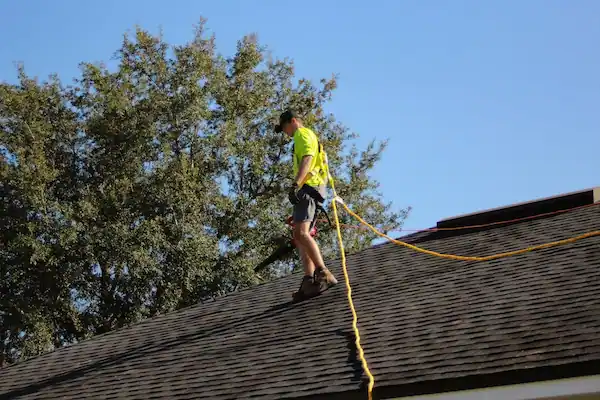Roof replacement is a significant home improvement project that can improve the overall value and safety of your home. Whether it’s due to age, wear, or damage, knowing how to calculate the cost of replacing a roof is essential for homeowners in Florida. In this article, we will discuss the different factors contributing to the overall cost and provide a comprehensive guide to help make the process easier. Keep reading to learn more.
Importance of an Estimate
When it comes to replacing your roof, it’s important to have an accurate estimate of the overall cost. To get an accurate estimate of the material cost, you need to know the square footage of your roof and the cost per square foot of the material you want to use.
Getting an estimate for your roof replacement project is important because it allows you to budget and plan accordingly. To get an estimate, you can hire a professional roofing contractor to come in and assess your roof and provide you with a quote. They will take into consideration the cost of materials, labor, and any other factors that could affect the overall cost of the project. You can also search for “roof replacement cost Florida” to get an estimate of your roofing cost online. Keep in mind that prices can vary depending on the manufacturer and supplier, so it’s always a good idea to shop around for the best prices available.
Roofing Materials Costs
When it comes to roofing materials, there are several options available for homeowners in Florida. The most common roofing materials include asphalt shingles, metal, tile, and wood shake. Asphalt shingles are popular due to their affordability and ease of installation. However, they have a shorter lifespan compared to other materials. Metal roofing, on the other hand, is more expensive but offers a long life expectancy, energy efficiency, and durability.
Tile roofing is common in Florida because of its resistance to harsh weather conditions, such as high winds and heavy rain. While the initial cost may be higher than other materials, the long-term value of tile roofs makes them a popular choice. Wood shake roofing, though aesthetically pleasing, requires more maintenance and has a shorter lifespan compared to other materials. It’s essential to consider the type of material and its cost when calculating roof replacement costs.
Labor Costs and Professional Installation

The cost of labor accounts for a significant portion of the overall roof replacement cost. In Florida, labor rates can vary depending on the region and the level of expertise of the roofing contractor. You’ll want to obtain quotes from multiple contractors to make an informed decision. To calculate labor costs, you should consider the total number of hours it will take the contractor to complete the project and their hourly rate.
It’s important to remember that the lowest quote isn’t always the best option. When it comes to roof replacement, the quality of the installation plays a significant role in the final result. A professional installation will ensure that the roof lasts for many years and withstands the harsh Florida climate. Poor installation can result in costly damages and repairs in the long run.
Take the time to thoroughly research each roof contractor, including verifying their licensing and checking for online reviews from previous clients. While this initial research may take some time, it’s essential to ensure a successful installation and a long-lasting roof for your home.
Permit Fees and Inspection Costs
In Florida, homeowners are required to obtain a permit for roof replacement projects. Permit fees can vary depending on the region and the scope of the project. Additionally, some local authorities may require an inspection of the completed project to ensure that it meets local building codes and safety standards.
When calculating the total cost of your roof replacement, it’s essential to consider these potential permit fees and inspection costs. Be sure to contact your local municipality to get information on the required permits and their associated costs. Factor these expenses into your overall budget to avoid any surprises during the project.
Keep in mind that some contractors may include the cost of permits and inspections in their estimate, while others may list them as separate expenses. Make sure to discuss these fees with your contractor and understand how they are factored into your overall roof replacement cost.
Cost of Debris Removal and Disposal
Roof replacement projects can generate a significant amount of debris, including old shingles, underlayment, and other materials. The cost of debris removal and disposal must be considered when calculating your overall roof replacement budget. Some contractors may include the cost of debris removal and disposal within their quote, while others may list it as an additional expense. Discuss this aspect of the project with your contractor to understand how it affects your total cost and budget accordingly. Additionally, homeowners may choose to rent a dumpster for the duration of the roof replacement project to manage construction waste. If you opt for this approach, be sure to factor the cost of the dumpster rental into your overall budget.
Impact of Roof Pitch and Complexity
The pitch, or slope, of your roof, plays a significant role in determining the overall cost of a roof replacement. Roofs with a steep pitch are more challenging to work on and may require additional safety measures. As a result, the labor costs associated with installing a roof on a steep slope will be higher than those for a flat or low-sloped roof.
Additionally, the complexity of the roof design can impact the overall cost. Roofs with multiple angles, valleys, dormers, or other architectural elements may require more labor and materials, increasing the overall project cost. Be sure to discuss the impact of your specific roof design with your contractor when calculating the total cost of your roof replacement.
Be sure to obtain accurate measurements of your roof’s dimensions, pitch, and complexity to help your contractor provide a more accurate estimate. This information will also assist in determining the quantity of materials required for the project.
Warranty and After-Sales Service

Another factor to consider when calculating the roof replacement cost is the warranty offered by the contractor and the manufacturer. A good warranty can offer peace of mind to homeowners by ensuring that any defects or damages are addressed promptly and without additional costs.
Manufacturer warranties typically cover the materials, while contractor warranties cover workmanship and installation. Make sure you understand the warranty details for both the materials and labor. Additionally, inquire about the after-sales service provided by your contractor, as this can help in the event of any issues that may arise after the project’s completion.
Note that choosing a contractor who provides a solid warranty and after-sales service may result in a slightly higher overall cost, but these additional expenses can pay off in the long run by preventing costly repairs and protecting your investment in your home.
Calculating your roof replacement cost involves taking into account several factors, including materials, labor, permits, debris removal, roof pitch, and warranty. By thoroughly researching contractors, materials, and other expenses, you can make an informed decision and protect the value and safety of your home. Remember, don’t just choose the cheapest option; consider the long-term value of a professionally installed, high-quality roof that will last for years.
Read Also: The Hidden Dangers Of Delaying Emergency Roof Repairs







